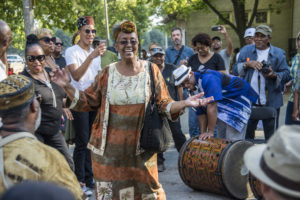Lollapalooza 2021 had some 385,000 attendees (without significant Covid-19 outbreak, fortunately) but featured little of host Chicago’s indigenous talent or styles. And that’s just wrong, declared Department of Cultural Affairs and Special Events commissioner Mark Kelly, launching the month-long Chicago in Tune “festival” at a reception August 19. Here’s the still-evolving event calendar of hundreds […]
Jazz community upends Englewood’s bad rep
The 18th annual free Englewood Jazz Festival in south side Hamilton Park last Saturday (9/16) affirmed the best of Chicago’s grassroots culture, promoting an opposite image of this challenged neighborhood as a dangerous place — unless one fears powerful, creative music that speaks as directly as dance rhythms to its family of listeners. Produced on behalf of the Live […]

